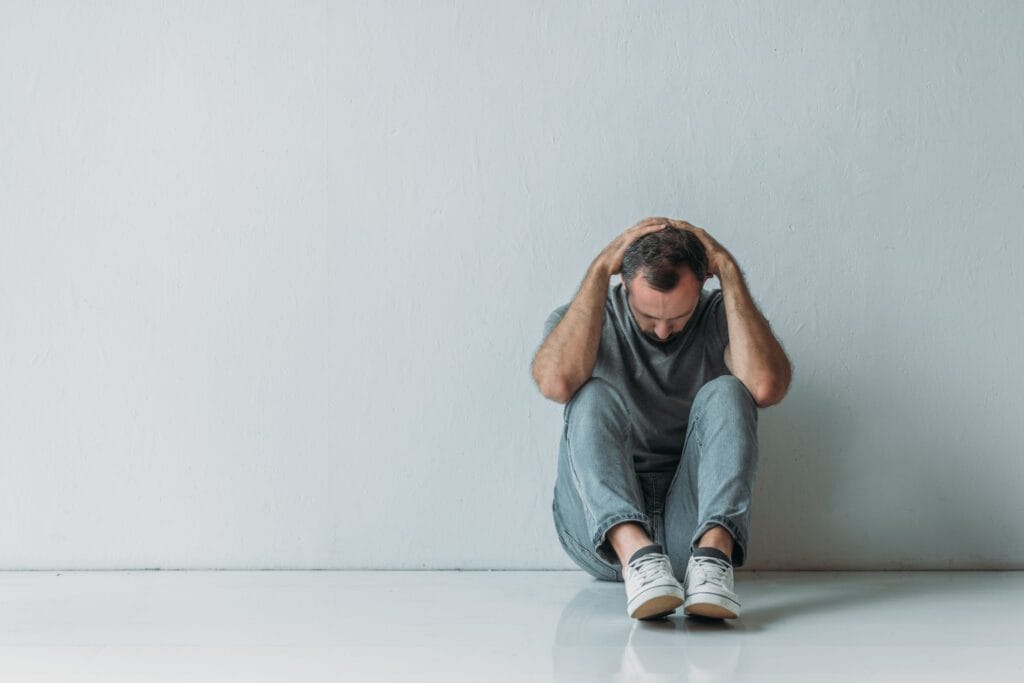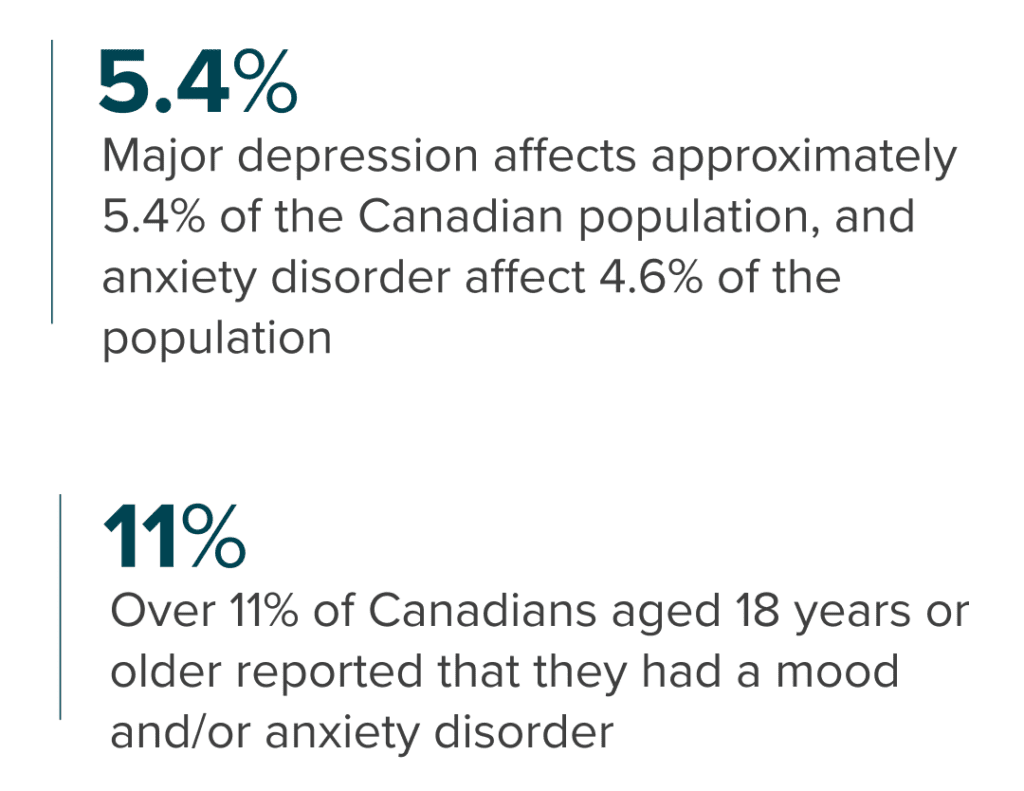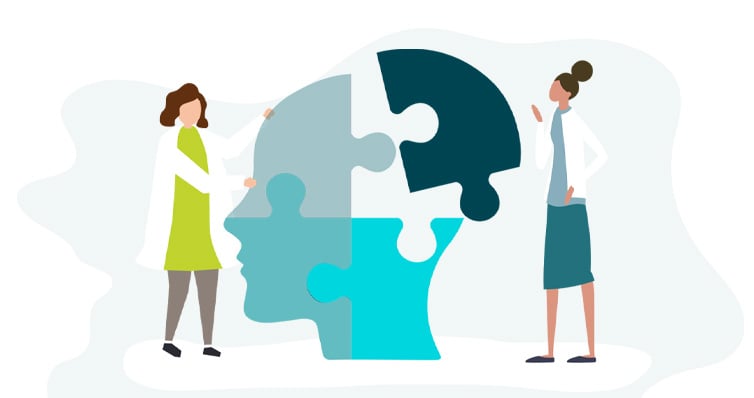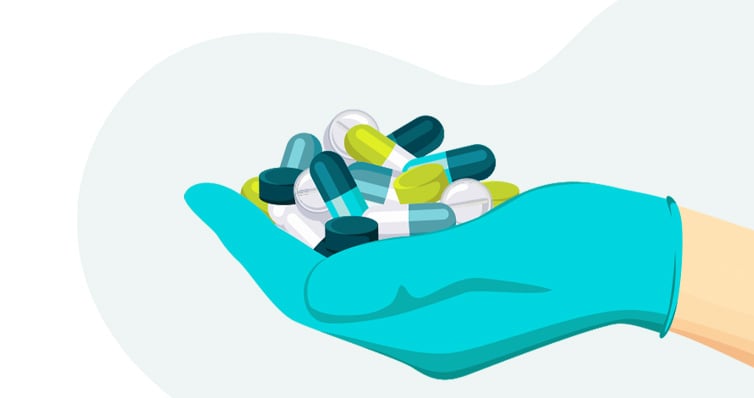Inpatient and Virtual Treatment for Depression, Bipolar Disorder, and Anxiety
Mood disorders, such as depression, bipolar disorder, and anxiety, can take control and prevent you from living a fulfilling life. Our evidence-based treatment programs equip you with the skills you need to create a life you love.

Our Approach to Depression, Bipolar Disorder, and Anxiety Treatment
If crippling feelings of despair or fear, panic attacks, or mood swings have taken the joy out of your life, we can help you get to a better life that you deserve.
Our evidence-based inpatient treatment for anxiety and depression helps you build constructive thoughts and behaviors through individual and group counselling, cognitive behavioural therapy (CBT), dialectical behavioural therapy (DBT), exposure therapy, medication management, exercise, and mindfulness.
You’ll work with a specialized team of doctors, therapists, nurses, psychiatrists, and other mental health experts who will help you build the foundation for lasting recovery.

What Are Anxiety Disorders?
There are several types of anxiety disorders, but they all share two key features: fear and anxiety. Fear is an emotional response to a real or perceived threat. Anxiety is an emotional state a person experiences in anticipation of a potential future threat. There are three major types of anxiety disorders:
- Generalized Anxiety Disorder (GAD) is the most common anxiety disorder in older adults. It is often linked to depression and is characterized by persistent, excessive, and intrusive worrying.
- Panic Disorder is characterized by unexpected episodes of intense fear with physical symptoms like shortness of breath, chest pain, heart palpitations, dizziness, and abdominal distress.
- Social Anxiety Disorder, also called social phobia, involves overwhelming anxiety and paralyzing self-consciousness in everyday social situations. It can be limited to one type of situation – such as public speaking – or it can be broad, occurring almost anytime the person is around others.
Anxiety and substance abuse often occur together. In some cases, people turn to alcohol or other substances to help them cope with anxiety symptoms. For people struggling with concurrent anxiety and substance addiction, research has shown that effectively treating one condition requires adequately addressing the other. Our team can help determine which of our programs is best suited to address your concerns.

What Are Mood Disorders?
“Mood disorder” is an umbrella term that refers to depression and bipolar disorders.
Depression
While it’s common for most people to experience feelings of sadness or depression from time to time, this isn’t the same as a depressive disorder. When people use the term clinical depression, they are usually referring to major depressive disorder (MDD). People with MDD experience most of the following symptoms for longer than a two-week period:
- Depressed mood
- Loss of interest in previously enjoyed activities or hobbies
- Fatigue
- Feelings of worthlessness and guilt
- Thoughts of death and suicide
- Changes in weight
- Sleep changes
More than 3 million Canadians will experience major depression at some point in their lives. People struggling with depression sometimes turn to substance use to soothe their emotional pain, however, this does not work for long.

Bipolar Disorder
Bipolar disorder is a mood disorder characterized by alternating periods of an abnormally elevated mood (known as mania) and major depression.
For most people, these manic episodes include feelings of euphoria, increased energy, hallucinations or delusions, less need for sleep, and increased sexual desire. Manic episodes can range from mild to severe, and can sometimes impair a person’s life and lead to hospitalization.
Depression symptoms can include loss of interest, insomnia or sleep changes, severe fatigue, and recurring thoughts of death or suicide.
People who have at least one manic episode, occurring with or without a depressive period before or after the mania, and also experience hypomania (less severe than mania) are considered to have bipolar 1 disorder.
People who have bipolar 2 disorder experience major depressive episodes that last at least two weeks and hypomanic episodes (less severe than mania) that last at least four days.

How To Succeed in Treatment for Depression, Bipolar Disorder, and Anxiety
At EHN Canada, you’ll have access to the support you need to feel good for good.
Your lasting success begins as soon as you contact admissions. Our admissions counsellors evaluate your needs to help you find the right program for you. For example, not every patient needs inpatient treatment; our online program is perfect for people who need more intensive support than occasional counselling, but can still function at work and at home.
Every aspect of treatment – from the structure and tight-knit community, to the evidence-based approach and limited distractions, and one-one-one and group counselling – is carefully selected to support your success. Our medical experts carefully monitor each patient and provide the recommendations needed to promote your recovery.
After treatment, eligible patients receive ongoing support through our comprehensive aftercare program, which includes access to group therapy sessions in person or online.
Featured Locations
Thanks to EHN Canada’s expansive network of facilities across the country, it’s easy to seek help close to home or farther afield.

EHN Bellwood Toronto
Toronto’s Leading Addiction and Mental Health Inpatient Treatment for addiction, trauma, OCD, eating disorders and other mental health concerns

EHN Bellwood Nova Scotia
Addiction Rehab in the Annapolis Valley, Nova Scotia - Holistic treatment in a warm, welcoming environment


